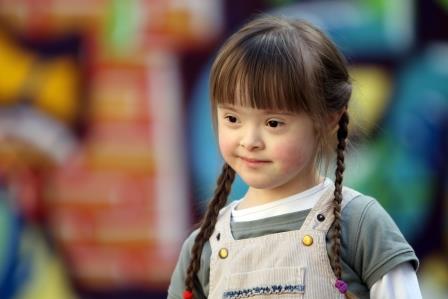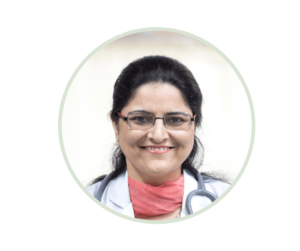Recently, one of our obstetric consultants met a mother with a 3-year old baby in her clinic. She was a playful and happy little baby but had a few characteristic features that set her apart. Payal had all the class signs of a baby with Downs Syndrome – a small chin, slanted eyes, a flat nasal bridge, a protruding tongue.
Because Payal’s milestones were delayed, her mom was also concerned about her development and well-being. “She started walking late and doesn’t talk as much as the other kids. I wonder if she’ll be able to go to a regular school,” her mom told us.
Now she was planning another pregnancy and had a whole list of questions for our consultant.
What is Downs Syndrome and why does it occur?
Perhaps what made Payal’s mother feel most anxious was not knowing everything about Downs Syndrome and how it would affect her future pregnancy.

The first thing to understand is that Down’s syndrome is not the fault of the mom, dad or the baby.
The disease occurs in 1 of every 1000 babies born alive and is caused by a genetic abnormality because of an extra chromosome in all or most of the cells.
As a woman gets older, the risks of having a child with Downs syndrome also increase steadily (1 in 100 at age 40).
Could I have been told about my baby’s condition while I was pregnant?
We offer screening tests for all women at Sitaram Bhartia to identify whether they’re at a high risk for having a child with Down’s syndrome. Those found to be at a high risk are offered either another blood test (NIPT) or an amniocentesis to know for sure.
How do you screen for Down’s syndrome?
At Sitaram Bhartia, women are screened for the risk of Downs Syndrome through an ultrasound and blood test between the 11th and 13th weeks of their pregnancy.
If you miss this window, a screening can be offered between 15-22 weeks of pregnancy. Approximately 1 in 10 women with a Downs baby will not be identified through this screen.
A positive screen test does not necessarily mean that you have a baby with Downs; you will need an amniocentesis to confirm.
What can be done if I’m carrying a child with Down’s syndrome?
Unfortunately, Downs syndrome is not curable and poses a life-long hardship for the child and the parents. Therefore, if discovered before 20 weeks, many parents choose not to continue with the pregnancy.
I want to plan for my next pregnancy. What are my chances of having another baby with Down’s syndrome?
You are at a higher risk of having a second baby with Downs Syndrome but this should not be a reason to avoid a second pregnancy. Your chances of having another baby with Downs Syndrome are 1:100 and may increase to 1:10 if either you or your partner have a specific genetic abnormality.
Early in your second pregnancy, a specialised test (CVS/amniocentesis) can be carried out to check if your baby has Down’s.
Can any other mental disorders also be detected while I’m pregnant?
Structural abnormalities of the brain can be ruled out through an ultrasound at 18-20 weeks.
Unfortunately, mental disorders like autism and cerebral palsy cannot be ruled out in the antenatal period.
Can I follow a particular diet to ensure my baby’s healthy brain development?
When you’re pregnant, you’ll need to increase your intake of folic acid and DHA (docosahexaenoic acid).
Evidence suggests that consumption of folic acid in the pre-conception phase and the first trimester reduces the occurrence of brain and spine defects.
DHA is important for the normal development of the retina and the brain and can be found in foods like fish oil. DHA supplements are also available; however no clear evidence exists to say that DHA supplements improve your baby’s neurodevelopment.
This article has been written with Dr. Anita Sabherwal Anand, Consultant, Obstetrician-Gynecologist at Sitaram Bhartia Hospital in South Delhi. Dr. Anita is a highly qualified gynecologist with 24+ years of experience who is trusted by low-risk and high-risk mothers alike for her guidance on having a healthy pregnancy and delivery.

MBBS, Lady Hardinge Medical College, University of Delhi (1992); MD (Obstetrics & Gynaecology), Lady Hardinge Medical College, University of Delhi (1997); DNB Secondary (Obstetrics & Gynaecology), National Board of Medical Education, New Delhi (1999)
Learn more about DHA, consult a gynecologist about it. Please call on +91 9871001458 to schedule a consultation with a senior gynecologist at our hospital in South Delhi.

